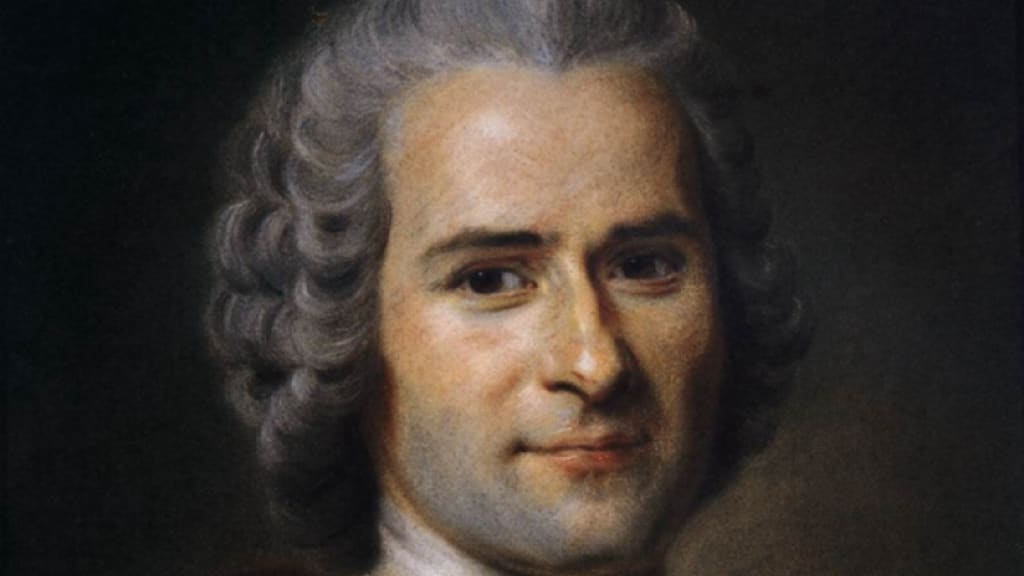
The German philosopher Immanuel Kant defines Enlightenment, as I understand it - as the willingness to publicly use one's reason. He describes this at the beginning of his essay 'An Answer to the Question 'What is Enlightenment?' as 'man's emergence from his self incurred immaturity' where immaturity is thought of as the abstinence from using one's own understanding without guidance. In choosing whether to compare either Rousseau or Marx, to Kant - I chose Rousseau; partly because of being saturated by Marx's works and also, more importantly - because Rousseau preceded both Marx and Kant and was writing in closer proximity to the events of the French Revolution.
Kant in his above mentioned essay, writes about the tendency to delegate faculties of thought to others, be it doctors or priests etc. An observation to be made here is that these roles do count on the ability of the subject in question to pay or provide for them (the services of those professionals), implying that there is a degree of money or/and power vested in this subject. This however would be a line of enquiry better addressed by Marx.
Rousseau however, in my reading would be the more classically enlightenment figure (Marx being obviously the more revolutionary), and this is reflected in the questions which he (Rousseau) chooses to take up in his first two discourses. 1) Whether the arts and the sciences (which were witnessing a re-emergence at the time of the Enlightenment) serve to purify or corrupt morals. 2) On the origin of inequality.
A point made by professor Michael Roth regarding the respective attitudes of Kant and Rousseau vis-a-vis the rapidly approaching epoch of modernity that the age (late eighteenth century) was witnessing, is important to note. Kant, though an admitted proponent of a republican government ( as seen in his essay 'Is the Human Race continually improving?) he is conservative in terms of how this goal is to be achieved. I say this because while he emphasised the importance of using one's reason, to debate, question convention, and think freely, he also pays deference to the then king of Prussia - Frederick the great; implying that the conditions of enlightenment are safeguarded under his just rule. An observation that I would like to make is that in reading such a position from our age, I do see a flash of genius in the ploy to present freedom of thought (in the garb of enlightenment) as an attribute of a ruler, rather than fashioning it into a weapon to overthrow him. In this sense one does see the point that professor Roth makes about Kant attempting to steer a middle path for philosophy, or - in words more akin to the German philosopher - to use reason, to make room for faith.
Rousseau's position vis-a-vis the enlightenment is interesting because he is not really a conservative trying to hold on to the status quo. As we have mentioned earlier, he addresses the question regarding the origin of inequality in society directly (in his second discourse) - which he identifies as private property (a theme the entire Marxist tradition would develop further on). To appreciate why he critiques the arts and sciences it is essential to grasp the imperfection he sees in them. He appeals, in his first discourse - that the arts and sciences degrade morals, arguing that their cultivation in society leads to the inculcation of needs which did not exist earlier, which form new kinds of dependences. A footnote from the First Discourse does reveal how Rousseau saw the arts and sciences playing to the detriment of a people -
“Princes always view with pleasure the spread, among their subjects, of the taste for Arts of amusement and superfluities which do not result in the exportation of money. For, besides fostering that pettiness of soul so appropriate to servitude, they very well know that all needs the Populace gives itself are so many chains binding it.” - from On the Question proposed by the Academy: Has the restoration of the sciences and arts tended to purify morals.
I can see here, very clearly how this may be read as a precursor to the Marxian critique of false consciousness or ideology which Althusser and his school propound, however this may be dealt with in another place. My brief reading of Jean Jacques Rousseau's first two discourses, in the light of Kant's definition of the enlightenment does show why he is an interesting and important figure in the history of philosophy, for he is able to embrace the tradition of the enlightenment (independent thought and reason) while still withhold the right to critique the disparaging effects of dependencies on the arts and sciences. In a certain sense this is not unlike Plato and his position on the poets of Athens.






Comments
There are no comments for this story
Be the first to respond and start the conversation.